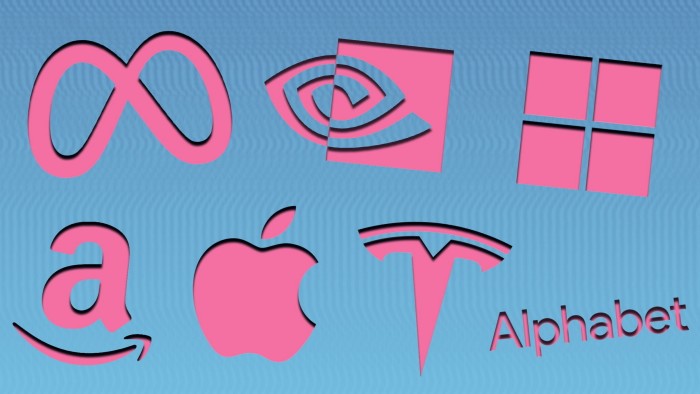Stay informed with free updates
Simply sign up to the US equities myFT Digest — delivered directly to your inbox.
The Magnificent Seven club of giant tech stocks has lost some of its lustre as investors sell shares in groups that have dominated Wall Street in recent years.
Apple, Microsoft, Google parent Alphabet, Amazon, Tesla, Nvidia and Facebook parent Meta posted huge gains in 2023 and 2024, propelling the broader US equities market higher because of their hulking market values. But that trend has reversed as the blue-chip S&P 500 has eked out a 4 per cent rise in 2025 despite a mixed performance by the Magnificent Seven.
The shift signals a significant change beneath the market’s surface as concerns rise over elevated valuations among many Big Tech companies, their growth prospects and plans for huge spending on data centres and other infrastructure to chase the artificial intelligence boom.
“The stock market has lost its leadership,” said Jim Paulsen, an independent market strategist.
A Bloomberg index tracking the Magnificent Seven has added just 1 per cent this year, with losses for Tesla, Microsoft and Alphabet offset by a 25.8 per cent rally for Meta. The Magnificent Seven had surged more than 160 per cent between the start of 2023 to the end of 2024.
The subdued performance this year has come as investors, such as hedge funds, have rotated away from the Magnificent Seven, according to Lisa Shalett, chief investment officer at Morgan Stanley Wealth Management.
At the same time, money managers have moved into other sectors.
In the week to February 3, US bank stocks attracted almost $2bn of inflows — the second-largest weekly figure since 2008, according to Bank of America — while healthcare companies, European equities, gold and smaller tech groups have been among the other main beneficiaries of investors’ repositioning.
“Since Christmas, trends have made a major shift,” said Mike O’Rourke from Jones Trading, who is credited with coining the term “Magnificent Seven”.
Longtime laggards in the value and mid-cap growth sectors are suddenly outperforming. Meanwhile, no member of the Magnificent Seven besides Meta — whose shares on Friday closed higher for a historic 20th consecutive session — even makes it to the list of top 50 growth stocks in 2025.
Investors have also been pouring money into privately held tech companies including Anthropic, Coreweave, Databricks, OpenAI, Perplexity, ScaleAI and xAI — which some now refer to as the “Private Magnificent Seven”.
Price data based on funding rounds and liquidations, seen by the Financial Times, show the cumulative valuation of the group rose 40 per cent between July and the end of January, easily outpacing the public Magnificent Seven over the same period.
Most investors say the broadening out of gains away from the Magnificent Seven is a healthy development for what had become an extremely expensive and top-heavy market.
Yet some of the software companies that have displaced semiconductor stocks such as Nvidia at the top of the S&P 500 are just as richly valued. Palantir and Arm Holdings trade at 69 times and 36 times expected revenue over the next 12 months, respectively, for example, suggesting that investors remain optimistic about AI.
Faster AI adoption and fewer barriers to entry than anticipated after China’s DeepSeek stunned the market last month with its cut-price AI service could spell long-term danger for the Magnificent Seven, according to JPMorgan analysts led by Mislav Matejka.
Although it would be premature to write off the stocks that have driven the market for so long, Matejka, who is the bank’s head of global equity strategy, said that “historically, it was never the incumbents which benefited from technological disruption, but the outsiders”.
Read the full article here




